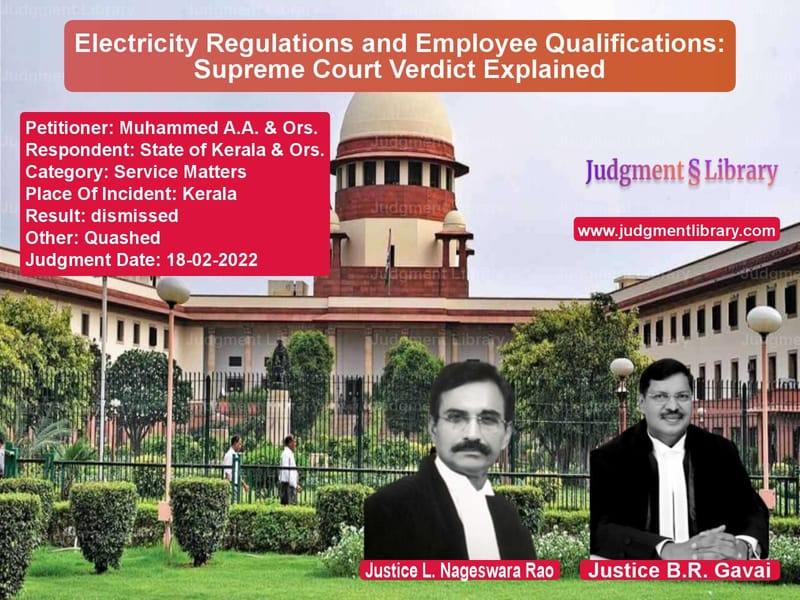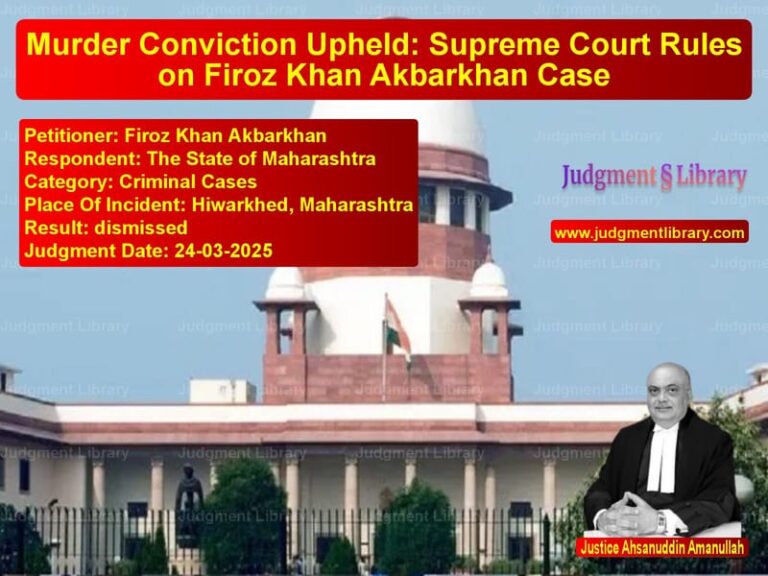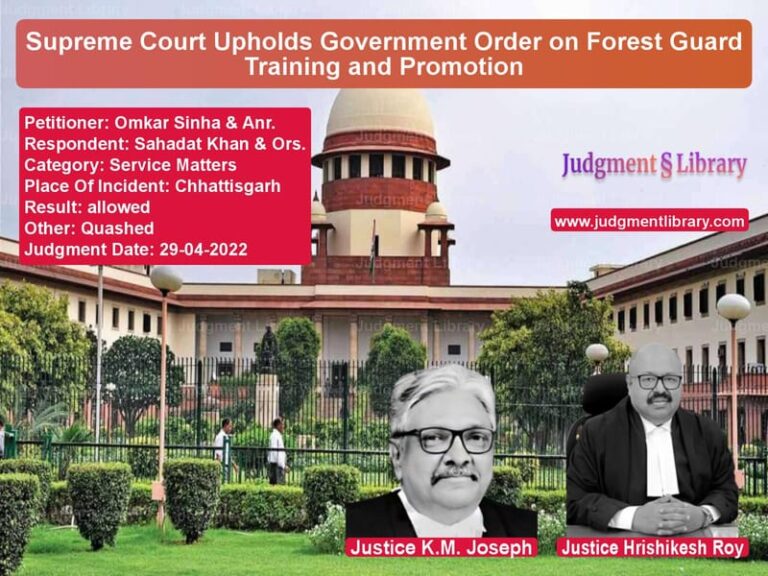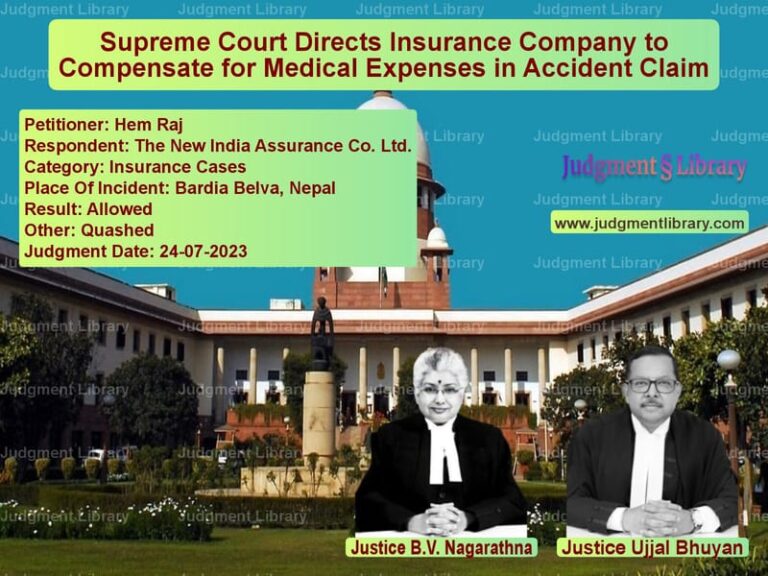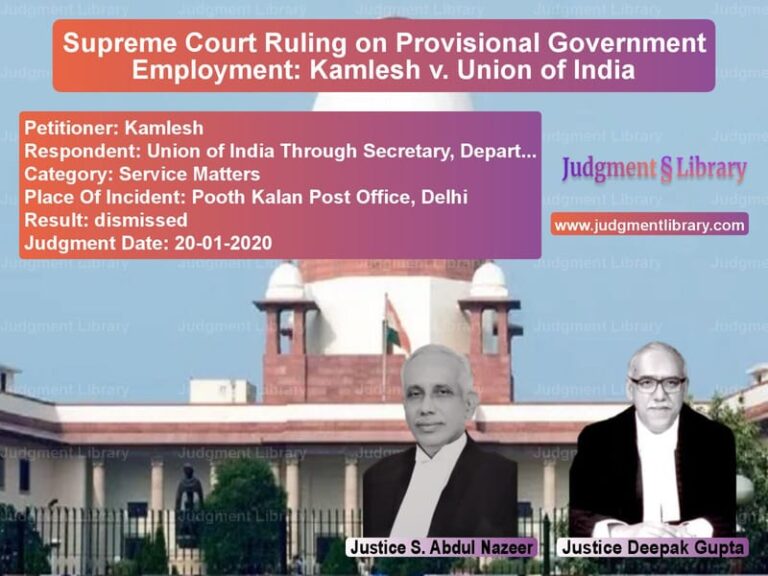Electricity Regulations and Employee Qualifications: Supreme Court Verdict Explained
The Supreme Court of India delivered a significant judgment in the case of Muhammed A.A. & Ors. vs. State of Kerala & Ors., addressing whether the Kerala government’s decision to exempt certain employees of the Kerala State Electricity Board Limited (KSEBL) from acquiring qualifications prescribed under the Central Electricity Authority (Measures relating to Safety and Electric Supply) Regulations, 2010 (hereinafter “Safety Regulations”), was valid. The case also examined whether Regulation 116 of the Safety Regulations, which allows deviations, was ultra vires the Electricity Act, 2003.
Background of the Case
The dispute arose when a group of petitioners challenged the Kerala government’s order dated 13.02.2019, which granted exemptions from the educational qualifications prescribed under Regulations 6 and 7 of the Safety Regulations to employees of KSEBL who were in service before 31.10.2013. The petitioners contended that this exemption allowed unqualified employees to be promoted, compromising safety standards and violating the rules set forth by the Central Electricity Authority (CEA).
A Single Judge of the Kerala High Court ruled that Regulation 116, which permits deviations, was beyond the scope of the Electricity Act and struck down the government order. However, the Division Bench of the High Court reversed this decision, upholding the government’s authority to grant deviations but limiting exemptions only to employees who joined KSEBL before 31.10.2013. Dissatisfied, the petitioners approached the Supreme Court.
Petitioners’ Arguments
- The petitioners, represented by senior counsel, argued that Regulations 6 and 7 of the Safety Regulations set essential qualifications for engineers, supervisors, and technicians in power plants and electrical grids.
- They contended that exempting employees from these qualifications posed serious risks to public safety and the efficient operation of power systems.
- The petitioners challenged the Kerala government’s reliance on Regulation 116, asserting that “deviation” cannot be interpreted as “exemption.”
- They claimed that the Kerala government’s decision was arbitrary and contravened the Central Electricity Authority’s authority to set national safety standards.
Respondents’ Arguments
- The Kerala government argued that Section 133 of the Electricity Act allows it to frame a transfer scheme protecting the service conditions of KSEBL employees.
- It contended that Regulation 116 permitted deviations in exceptional circumstances, including for employees with experience but lacking formal qualifications.
- KSEBL and employee unions defended the exemption, stating that experienced employees should not be forced to acquire additional qualifications retrospectively.
- The state government also argued that its exemption was limited only to employees who joined before 31.10.2013, ensuring fairness in employment practices.
Supreme Court’s Judgment and Analysis
The Supreme Court upheld the Kerala High Court’s decision and ruled that the government’s order was valid in so far as it granted exemptions to employees who were in service before 31.10.2013. However, the Court struck down the exemption for employees who joined after this date.
Key Observations of the Supreme Court:
- Regulation 116 is not ultra vires: The Court found that the regulation permitting deviations was within the authority of the Central Electricity Authority and was not unconstitutional.
- Deviation includes exemption: The Court interpreted “deviation” in Regulation 116 broadly, ruling that it could encompass exemptions for experienced employees.
- Transfer scheme protects service conditions: The Court held that the transfer scheme under Section 133 of the Electricity Act safeguarded the service conditions of employees who transitioned from the Kerala State Electricity Board to KSEBL.
- Limitation on exemption: The Court upheld the High Court’s decision to restrict exemptions only to employees who joined before 31.10.2013, ensuring that newer employees met the prescribed qualifications.
Key Excerpts from the Judgment
The Supreme Court observed:
“In the facts of the present case, we are not in agreement with the Appellants that granting exemption to the erstwhile employees of the KSEB from possessing the qualifications provided in Regulations 6 and 7 is an impermissible exercise of power under Regulation 116 of the Safety Regulations.”
The Court further stated:
“The width and amplitude of Regulation 116 cannot be restricted by interpreting the word ‘deviation’ as having lesser scope than exemption. ‘Deviation’ from the Regulations would amount to either exemption or relaxation.”
Final Verdict
The Supreme Court ruled:
“The appeals are dismissed. The judgment of the High Court is upheld to the extent that exemption from the qualifications under Regulations 6 and 7 is granted only to employees who joined before 31.10.2013. The government order to the extent that it grants exemption to employees appointed after this date is quashed.”
Conclusion: Implications of the Judgment
This judgment clarifies critical legal principles:
- It upholds the authority of state governments to grant exemptions under Regulation 116 while ensuring they are not applied arbitrarily.
- It balances the need for safety in power plants with fairness to experienced employees who lacked formal qualifications at the time of transition.
- It reinforces that any deviation from national safety standards must be carefully justified and cannot compromise public interest.
The ruling serves as a precedent for future disputes regarding employee qualifications and regulatory deviations in state-run enterprises, ensuring that both operational safety and employee rights are safeguarded.
Petitioner Name: Muhammed A.A. & Ors..Respondent Name: State of Kerala & Ors..Judgment By: Justice L. Nageswara Rao, Justice B.R. Gavai.Place Of Incident: Kerala.Judgment Date: 18-02-2022.
Don’t miss out on the full details! Download the complete judgment in PDF format below and gain valuable insights instantly!
Download Judgment: muhammed-a.a.-&-ors.-vs-state-of-kerala-&-or-supreme-court-of-india-judgment-dated-18-02-2022.pdf
Directly Download Judgment: Directly download this Judgment
See all petitions in Employment Disputes
See all petitions in Promotion Cases
See all petitions in Transfers Cases
See all petitions in Public Sector Employees
See all petitions in Workplace Harassment
See all petitions in Judgment by L. Nageswara Rao
See all petitions in Judgment by B R Gavai
See all petitions in dismissed
See all petitions in Quashed
See all petitions in supreme court of India judgments February 2022
See all petitions in 2022 judgments
See all posts in Service Matters Category
See all allowed petitions in Service Matters Category
See all Dismissed petitions in Service Matters Category
See all partially allowed petitions in Service Matters Category

